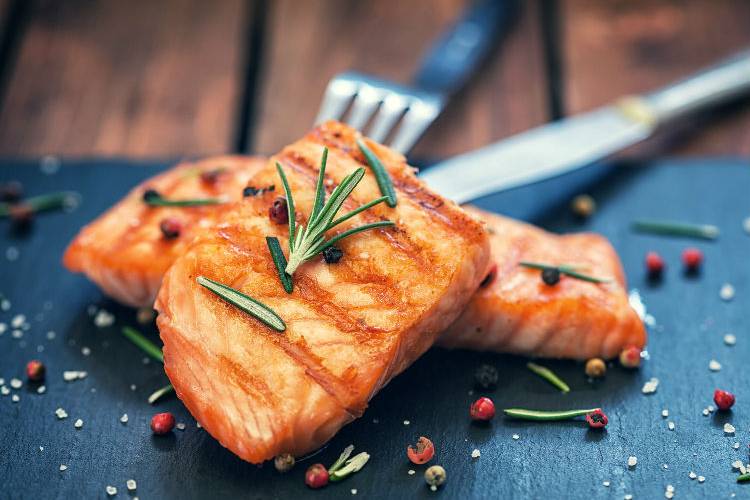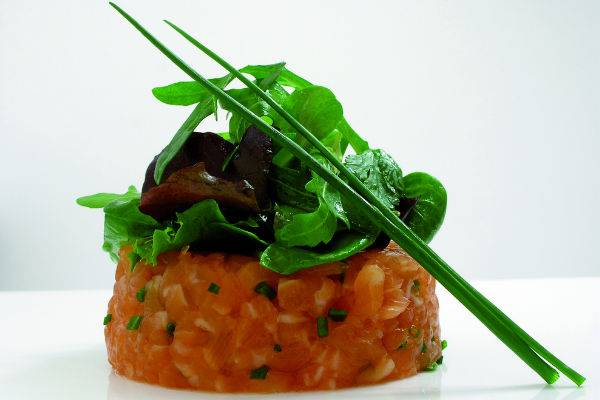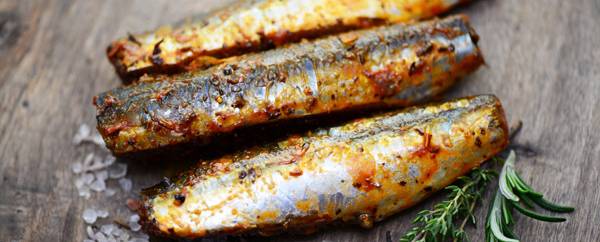Salmon, a very nutritious and tasty food, essential to our diet
Salmon is the common name given to fish that characteristically has an elongated body covered with small rounded scales and a fleshy fin between the dorsal fin and tail. These fish belong to the family of salmonids, which are highly appreciated by both sports fishermen and consumers because of their very tasty pink meat.
fresh food
Share

Salmon is a migratory fish that lives in both fresh and salty water; they are born in fresh water where the egg laying takes place, and after a few years they travel to the sea where they develop until reaching their sexual maturity. At this point, they return to the place where they were born up the river to lay eggs and repeat the cycle. This is the moment when their meat is at peak condition and their colours are brighter. Although salmon was once one of the most abundant fish in the cold regions of Europe, nowadays it is rare to find salmon in the wild since most of it comes from fish farms.
Due to the high fat content in its flesh, i.e., over 5%, it is an oily fish and it is precisely this fat that makes its energy value higher than other fish.
Salmon is a very nutritious, tasty food, essential to our diet. From a nutritional viewpoint, it is rich in high quality proteins similar to those in meat and eggs, which contain all the essential amino acids that the human body cannot make and need to ingest through diet.
The regular consumption of salmon during pregnancy and breastfeeding is very important for the development of the foetus
Its carbohydrate content is very low; however, it is rich in vitamins from the B group and fat-soluble vitamins A and D, essential for good growth. In terms of minerals, it is worth mentioning that it contains iodine, phosphorus and zinc.
What is really interesting in its composition is its fats. It is rich in polyunsaturated fatty acids, especially omega-3 fatty acids. These fatty acids have various functions and benefits
• They are involved in brain maturation and growth during pregnancy and childhood.
According to some studies, the regular consumption of salmon during pregnancy and breastfeeding is very important for the development of the foetus, especially during the last stage of pregnancy as it contributes to the correct formation of the membranes and neural structures.
• Production of anti-inflammatory substances that prevent the formation of thrombi in the blood and prevent cardiovascular diseases.
• Control of cholesterol and triglyceride levels.
Because of the above, it is recommended that we should consume oily fish 1-2 times a week.
We can currently find salmon on the market all year round and at an affordable price for both fresh and frozen or smoked. If bought fresh, you must take into account the general signs of freshness in fish:
• Bright, damp-looking skin and vivid colours.
• Well adhered scales.
• Smells like seawater.
• The meat should be firm, elasticated and consistent.
• The eyes are bulging and shiny.
The fat percentages of fish depend on several factors, including seasonality (they tend to be higher in summer and autumn), and the age of the fish (generally the younger the fish, the lower the fat percentage). |

Due to its high fat content, salmon spoils easily. Therefore, it must be quickly refrigerated when brought home in a sealed container or covered with tin foil or cling film (it is not advisable to leave it in the paper from the fishmongers as it would spoil very quickly). Fish is a food with a high bacterial count so it should not be kept refrigerated for more than 2 days.
Salmon is a fish that is usually enjoyed by the consumer, despite having a stronger flavour than white fish, therefore it can be introduced into the diet to make salads, pasta dishes, pâtés, pizzas, pastries, croquettes, or in fillets or chops that are boiled, grilled, griddled, oven-baked, in “papillote" and so on.
SMOKEN SALMON
Along with drying and salting, smoking is one of the oldest techniques for treating and preserving fish. Smoke from non-resinous woods is used for this process, and even aromatic woods such as oak or laurel are sometimes used. Smoked salmon lasts much longer because the smoke contains compounds that eliminate bacteria, as well as changing the taste, texture and colour of the salmon, making it more enjoyable for some consumers.
Dressing smoked salmon:
For canapés or dishes, smoked salmon can be served with various accompaniments: chopped French onion, chopped boiled eggs, capers and more. Whatever the dressing, you can add a splash of mild olive oil to salmon, improving the cardiovascular properties of the dish.
SALMON SALAD
Ingredients for 4 people: 300g. of salmon, 2 lemons, 100g. of black olives, 2 boiled eggs, 1 lettuce, virgin olive oil, cider vinegar, white pepper, salt.
Preparation
Cut the salmon into thin slices, season it with the salt and pepper and leave it to marinate for 3 minutes in the lemon juice. Meanwhile, wash the lettuce and cut it into julienne strips, distributing it on to a platter. Dress with the virgin olive oil, cider vinegar and salt. When the salmon has changed colour, drain it and place it on top of the lettuce. Top with the black olives and chopped boiled eggs.
OVEN-BAKED SALMON
Ingredients for 4 people: 4 salmon fillets, 2 potatoes,2 onions, 2 tomatoes, 2 green peppers, 1 splash of dry white wine, choppedparsley, olive oil, salt and pepper.
Preparation
Cut the potatoes as you would for a "tortilla" (Spanish omelette), and the onions and peppers into rings. Fry each ingredient separately whilst taking care that the potato does not brown too much. Chop the garlic and mix it with the white wine and parsley, and cut the tomatoes into thin slices.
Rub a baking tray with olive oil and place a layer of potato, then onion, pepper, tomato, and top with the salmon fillets; seasoned. Place into a hot oven for five minutes.
After this, add the sauce made of wine, garlic and parsley, and return to the oven until the salmon and vegetables are properly cooked.

Sardines, how delicious…
Read more
Sardines, how delicious…






